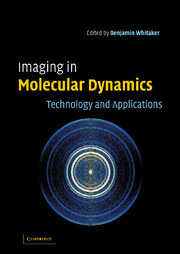Book contents
- Frontmatter
- Contents
- List of contributors
- Preface and acknowledgements
- List of abbreviations
- Part 1 Technology
- 1 Charged particle imaging in chemical dynamics: an historical perspective
- 2 Velocity map imaging: applications in molecular dynamics and experimental aspects
- 3 Reconstruction methods
- 4 Orientation and alignment
- 5 Time resolved cameras
- 6 3-D Imaging technique – observation of the three-dimensional product momentum distribution
- 7 Photoelectron and photoion imaging with femtosecond pump-probe time clocking
- Part 2 Applications
- Index
5 - Time resolved cameras
Published online by Cambridge University Press: 07 August 2009
- Frontmatter
- Contents
- List of contributors
- Preface and acknowledgements
- List of abbreviations
- Part 1 Technology
- 1 Charged particle imaging in chemical dynamics: an historical perspective
- 2 Velocity map imaging: applications in molecular dynamics and experimental aspects
- 3 Reconstruction methods
- 4 Orientation and alignment
- 5 Time resolved cameras
- 6 3-D Imaging technique – observation of the three-dimensional product momentum distribution
- 7 Photoelectron and photoion imaging with femtosecond pump-probe time clocking
- Part 2 Applications
- Index
Summary
Introduction
For many years two-dimensional (2-D) and three-dimensional (3-D) fragment imaging techniques have been successfully used in the study of molecular structure [1] and for the study of the dynamics of various molecular dissociation processes, such as photodissociation [2], dissociative recombination [3], atom–molecule collision induced dissociation [4], dissociative charge exchange [5], and others (see review by Zajfman and Heber [6]). The basic experimental scheme includes induced dissociation of a single molecule, from either a molecular ion beam or gas target, and the fully correlated measurement of the asymptotic velocity vectors of the outgoing fragments. If the initial velocity of the molecule is large, then all the fragments will be projected into a cone defined by the ratio of their transverse velocities and the initial beam velocity. In such a case, the transverse velocities are deduced from the 2-D position on the surface of a position sensitive detector, while the longitudinal velocities can be derived from the time of arrival at the detector. The specific physical information provided by the images depends on the particular dissociation process. In general, one obtains information about the initial molecular quantum state prior to the dissociation and the final state of the fragments and about the dynamics of the reaction, such as angular dependence, kinetic energy release or potential curves.
- Type
- Chapter
- Information
- Imaging in Molecular DynamicsTechnology and Applications, pp. 122 - 137Publisher: Cambridge University PressPrint publication year: 2003
- 1
- Cited by

